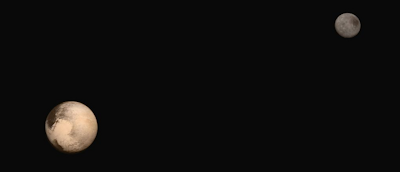Charon
Widespread broadcast coverage of the flyby of Pluto by the New Horizons spacecraft led to criticism of the pronunciation of the name of the planet’s largest and innermost moon, Charon. Officially, it’s from Greek mythology, the name of the ferryman who conveyed the souls of the departed across the river Styx into the underworld, whose god, Hades, was often euphemistically called Pluto, the rich one (hence plutocracy) because of all the good stuff that comes from the earth. So Charon ought to have an initial k sound, as the dictionaries firmly say. But some astronomers pronounce it with an initial sh.

Pluto and its largest moon Charon in enhanced colour (Photo: NASA)
The reason lies in the story behind its naming by the American astronomer James Christy, who discovered the moon in 1978. He suggested modifying his wife’s name, Charlene, by adding -on to its first element to match the names of elementary particles like proton and meson. Hence, Charon. He wasn’t well up on Greek mythology and was surprised and pleased to find that it fitted neatly. However, the International Astronomical Union (IAU), arbiter of celestial nomenclature, preferred the Greek mythological origin to the personal one and so implied the word should have an initial k sound. But many American astronomers, those in the New Horizon team especially, know where the name really came from and say it with initial sh as an in-joke, to the annoyance of classically aware listeners unaware of the story.
Pluto has five known moons, the others being Styx, Nix, Kerberos and Hydra. Nix is also spelled Nyx, the Greek goddess of the night, the mother of Charon. Hydra is the nine-headed monster slain by Hercules, the nine referring to Pluto being the ninth planet in the solar system. A related beast guarded the entrance to the underworld, the three-headed watchdog whose name is spelled in English as Cerberus and said with an initial s. In that spelling, it came second in a public poll in 2013 to name the moons. But the IAU prefers the classical Kerberos so it’s always pronounced with an initial k.
